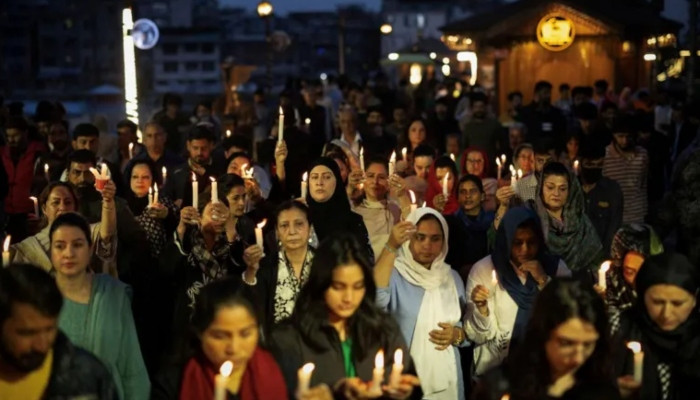Rising Hostility Towards Kashmiris Following Pahalgam Attack
Amidst heightened tensions between Pakistan and India at the Line of Control (LoC), Kashmiris throughout India are encountering increased violence following the tragic attack in Pahalgam, Indian Illegally Occupied Jammu and Kashmir (IIOJK), which resulted in the deaths of 26 tourists last week.
A video circulating on social media depicts Shabir Ahmad Dar, a resident of IIOJK who has been selling pashmina shawls in Mussoorie for two decades, being publicly assaulted and harassed along with a fellow Kashmiri salesman.
The footage reveals members of a Hindu right-wing organization assaulting and verbally abusing Shabir and his colleague while vandalizing their stall on a bustling boulevard.
“They held us responsible for the attack, ordering us to leave town and never return,” Shabir recounted.
His merchandise, valued at thousands of dollars, remains unattended at the stall. “We are too afraid to go back,” he confessed.
Although authorities apprehended three individuals in response to the assault, their subsequent release on bail after paying a fine and apologizing to the victims has done little to alleviate the pervasive fear within the Kashmiri community in Mussoorie.
By then, Dar had already departed, along with numerous other Kashmiri shawl vendors who, after residing in Mussoorie for many years, no longer feel secure.
The Pahalgam incident has triggered a surge of animosity towards Kashmiris residing in various Indian cities.
Reports have surfaced, detailing instances of harassment, denigration, and threats directed at Kashmiri vendors and students by right-wing groups, classmates, customers, and neighbors.
Disturbing videos circulating online depict Kashmiri students being pursued off campuses and assaulted in public.
A survivor of the Pahalgam attack, whose naval officer husband perished in the incident, has appealed for peace, urging people not to target Muslims and Kashmiris. “We desire peace and nothing else,” she pleaded.
Despite these pleas for calm, fear has compelled many Kashmiris, like Shabir, to return to their homeland.
Ummat Shabir, a nursing student in Punjab, recounted how women in her neighborhood labeled her a “terrorist who should be expelled.”
“The same day, a taxi driver forced my classmate out of his vehicle upon learning she was Kashmiri,” she stated. “It took us three days to return to Kashmir, but we had no alternative. We had to leave.”
However, for numerous returnees, even their homeland no longer provides a sense of security.
As the investigation into the Pahalgam attack progresses, security forces in IIOJK have detained thousands of individuals, closed over 50 tourist destinations, deployed additional army and paramilitary personnel, and demolished multiple homes belonging to families of suspected attackers accused of “terrorist affiliations.”
This crackdown has instilled fear and apprehension among civilians, many of whom consider these actions a form of “collective punishment” against them.
While IIOJK Chief Minister Omar Abdullah emphasized the importance of punishing the guilty, he cautioned against allowing “innocent people to become collateral damage.”
Former chief minister Mehbooba Mufti also criticized the demolitions, urging the government to distinguish between “terrorists and civilians.”
Another student, preferring to remain anonymous, stated, “Whenever tensions escalate, we are the first to suffer the consequences. Yet, we are still treated as suspects and expected to put our lives on hold.”
Shafi Subhan, a shawl seller from Kupwara district who also worked in Mussoorie for two decades, observed that the current backlash feels significantly more severe than in the past.
He stated that he had never encountered public threats before, even after the 2019 Pulwama attack, which resulted in the deaths of 40 paramilitary police officers.
Mussoorie felt like home to him, a place where he found peace, despite being hundreds of kilometers away. He shared a deep connection with his customers, who came from all parts of the country.
“People were always kind to us, appreciating our garments,” Subhan recalled. “But on the day our colleagues were attacked, no one intervened. The public simply stood by and watched. It inflicted physical harm, but the emotional impact was far greater.”
Peace has long been fragile in the area, leaving citizens caught in a precarious situation.
While officials highlight recent advancements in infrastructure, tourism, and investment as signs of stability since the revocation of the region’s special constitutional status in 2019, critics contend that this stability has come at the cost of civil liberties and political freedoms.
“The local population is always under suspicion, even though militancy has decreased in the last decade and a half,” notes Anuradha Bhasin, managing editor of the Kashmir Times newspapers. “They constantly have to prove their innocence.”
Following the recent attack, Kashmiris organized candlelight vigils and protest marches, with a complete shutdown observed the day after the killings and newspapers printing black front pages.
Omar publicly apologized, acknowledging his “failure” to protect visitors.
Bhasin emphasized that Kashmiri condemnation of such attacks is not new, stating, “No one there condones civilian killings; they understand the pain of losing loved ones too well.”
“This will only intensify fear and further isolate people, many of whom already feel disconnected from the rest of the country,” she concluded.



Comments (0)
No comments yet. Be the first to comment!
Leave a Comment